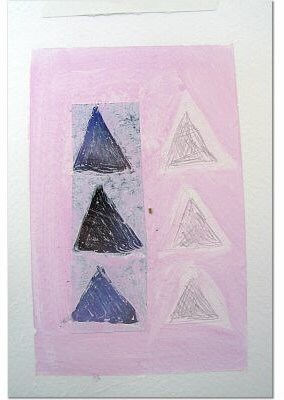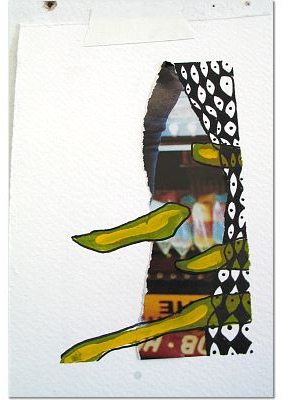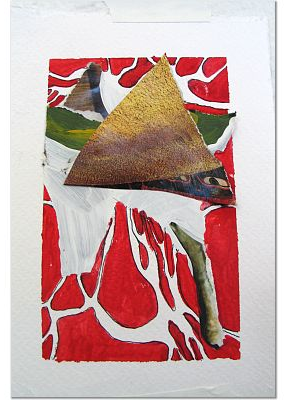 1.
1.
I would never submit to shiatsu massages for three reasons: I don’t like having strangers touch me; I begrudge the expense; and I don’t believe in “alternative” therapies. Nevertheless, for more than a year I have been going regularly for a weekly shiatsu treatment, and I have even submitted to several rounds of acupuncture. Such is the contradictory life one leads here in Jerusalem – probably anywhere.
The man who is treating me with shiatsu, whom I will call Marc, is not a stranger. He and his wife are part of our wider circle of friends, and I have known them slightly for years. He is approaching seventy, originally from France, of North African descent, and an artist, formerly an architect, as well as a serious student of traditional Chinese medicine, from which shiatsu, a Japanese technique, derives. He is introverted and has good hands. I don’t always enjoy what he does to my body. Sometimes he presses hard on sensitive places, and it hurts, but I always feel better after a treatment, and it appears to have had a good long term effect on me. I haven’t had a serious cold or caught the flu since I began treatment, though I have had some tendonitis and other aches and pains.
Maybe it would be easier if my shiatsu man were a total stranger. I enjoy privacy. I am self-protective. I want to choose the people I am intimate with and what I reveal to them. Writing may be a form of self-exposure, but it is controlled. I don’t let readers see what I don’t want them to see, if I can help it. But self-protection can be self-defeating. What one conceals from others ends up being concealed from oneself. Marc wants to make me feel better, and he can’t do that unless I submit my body to his hands without protecting it. Perhaps that very submission is a step toward handling my last years in the best possible way – accepting help, admitting vulnerability.
I have another acquaintance who is a chiropractor, and I once asked him what it was like to touch people all the time, in a society where people don’t ordinarily act that way. He agreed with me that our society is not one where people are comfortable touching one another, and he said that he had to learn to touch his patients “with authority.” That’s a good way to describe the way Marc touches me.
What is it about touching one another? I grew up on the East Coast of the United States, where white people, especially white men, kept their hands off one another. When I was growing up, people thought that if you wanted to touch another man or be touched by another man, you were probably a fairy. Recently it appears that American men, some of the people who visit us in Israel, hug each other when they meet, but I’m not comfortable with that. Israel is a more spontaneous and demonstrative society than white American society, Mediterranean in that respect, but people still don’t go around laying their hands on strangers. Anyway, I like people to keep a certain distance.
You can’t touch people you don’t know, because touching people is such a powerful way of knowing them. You don’t want strange people touching you, because it breaks down your social self. Sex workers obviously touch their clients, providing contact that would ordinarily be intimate, but, I imagine, in an impersonal way. The shiatsu therapist creates an intimacy that is not sexual, touching your body in places where you are not used to being touched, in ways that you never expected to be touched. There is knowledge, and it is reciprocal. The shiatsu therapist knows what’s going on in the patient’s body, and the patient learns something about the therapist from the way the treatment goes.
2.
When I arrive in Marc’s treatment room, which is also a small art studio, I change into thin trousers and a tee-shirt, if I am not already dressed that way, and I take off my shoes and socks. Marc spreads a fresh sheet of paper on his treatment table. I lie on my stomach, putting put my head in a round, cushioned circle that allows me to keep my neck straight, as if my face were buried in a pillow, without suffocating. The lights are dim, though they could be bright, as far as I am concerned, since I keep my eyes closed. Marc plays quiet music, often Chinese music, which I put up with, while he works, starting on my back.
 Marc is intuitive and creative in his approach to shiatsu. He starts each treatment more or less the same way, massaging my back, but there’s no telling how they’ll develop. He does what his hands tell him to do. Usually I am responsive, very much present in my body. Sometimes I feel a hot current surging between two points that Marc touches. When he touches me in two places, like my ankles, I might feel pressure in a third place, on my back, where I know he is not touching me. I often try to be aware of what he is doing to me and cooperate, visualizing the pressure. I believe that Marc is a gifted practitioner. His treatments are unpredictable and surprising, and it’s rather surprising to note the swings in mood and alertness that I experience during a treatment. Shiatsu works on the mind in the body, the body of the mind. During my first round of treatments with Marc, which I quit after a couple of months, he told me that my brain (thought) was dominating my body. I was thinking too much, trying too hard to control everything with my mind. I had no idea how he sensed that from giving me massages, but I took it for a valid insight. Marc is an intelligent, insightful, and creative man, who has immersed himself in Chinese thought, medicine, and art, including Zen calligraphy, where the point is freeing movement from the superficial, conscious flow of the mind, to allow deeper levels of mind and body to express themselves. I trusted Marc’s insight, especially since it tallied with my own sense of where I was as a person who wanted to be more creative. I have been involved with literature and music and for a long time, and have been held back by my inability to free the spirit from the mind – and more deeply, I think, by a lack of boldness. Obviously that’s connected to self-protection. Control is a way of protecting yourself.
Marc is intuitive and creative in his approach to shiatsu. He starts each treatment more or less the same way, massaging my back, but there’s no telling how they’ll develop. He does what his hands tell him to do. Usually I am responsive, very much present in my body. Sometimes I feel a hot current surging between two points that Marc touches. When he touches me in two places, like my ankles, I might feel pressure in a third place, on my back, where I know he is not touching me. I often try to be aware of what he is doing to me and cooperate, visualizing the pressure. I believe that Marc is a gifted practitioner. His treatments are unpredictable and surprising, and it’s rather surprising to note the swings in mood and alertness that I experience during a treatment. Shiatsu works on the mind in the body, the body of the mind. During my first round of treatments with Marc, which I quit after a couple of months, he told me that my brain (thought) was dominating my body. I was thinking too much, trying too hard to control everything with my mind. I had no idea how he sensed that from giving me massages, but I took it for a valid insight. Marc is an intelligent, insightful, and creative man, who has immersed himself in Chinese thought, medicine, and art, including Zen calligraphy, where the point is freeing movement from the superficial, conscious flow of the mind, to allow deeper levels of mind and body to express themselves. I trusted Marc’s insight, especially since it tallied with my own sense of where I was as a person who wanted to be more creative. I have been involved with literature and music and for a long time, and have been held back by my inability to free the spirit from the mind – and more deeply, I think, by a lack of boldness. Obviously that’s connected to self-protection. Control is a way of protecting yourself.
==== 
3.
I first went to Marc for treatment several years ago, when I had a stiff neck, but I stopped after a few weeks, when my neck got better. I wasn’t ready to be touched so deeply. Then I had a serious inflammation in my left shoulder, and I had the choice between a cortisone injection and acupuncture. I decided to let Marc try acupuncture, and if that failed, I could always have the injection. The acupuncture succeeded, and I decided to see what else his treatments could do for me. I may not “believe” in alternative therapies, but, empirically, acupuncture and shiatsu work. My neck got better the first time around, and my shoulder got better the second time.
When I returned to Marc for treatment, it was for acute pain in my shoulder, which he cured with a few weeks of acupuncture. I decided to keep up the treatments, because I believed that they would help me move toward the freedom that I desire (free flow of energy) but somehow cannot allow myself to enjoy (blocked energy). Very often, during the treatments, I fall into a dream-like state, not quite sleep, and not quite waking, and I can barely remember anything that flits through my consciousness then – combinations of sensations, feeling what Marc is doing to my body and noticing my body’s response, with images and memories. I hope that by submitting to shiatsu, by cooperating with shiatsu, by experiencing shiatsu, I can allow myself to be who I really am, to discover who I am and allow myself to be that person. Maybe I should be seeing a psychotherapist and not a shiatsu therapist. About a year and a half after beginning my weekly treatments, I went through a health crisis that was difficult to define but, I felt, related to emotional changes. I had almost no physical energy. In one treatment, I felt as if my body were someone else’s. I surrendered my body to the treatment and absented myself from it. In contrast to most treatments, it felt almost inanimate. That was something new for me, something to ponder. There was no free flow of energy, because there was little or no energy at all. . I explained this phase to myself as part of the equilibrating process: the liberated energy was probably flowing too strongly in one direction, creating an imbalance, leaving a low level of energy in the places that it left, the way water behaves when you move a big tub from one place to another. The contents slosh back and forth, so that one part is too low and the other is too high. Eventually, balance is restored.
It’s hard for me to accept this kind of language and hard for me to think that I’m not fooling myself. What energy? What flow? What balance? Should I trust Marc? Should I trust him because he is sensitive and intuitive, or because he has studied Chinese medicine? Despite my questions, I do trust him, and in large part because the treatment is non-verbal. If my problem is that I’m too “mental,” a symptom of that is that I over-verbalize. To restore the balance, I have to relax the mental control I exert so constantly by means of words. I have to get past words.
4.
This is a problem for a Jewish person. Both Marc and I went through an Orthodox Jewish phase, and both of us have gone past it. I have never discussed this subject with him, but I know from other friends of his that he and his wife were once deeply involved in Jewish study and observance. My involvement with Judaism was expressed in the acquisition of Jewish skills and knowledge: learning Hebrew, studying traditional texts, learning how to participate in services, learning how to celebrate the holidays at home, and trying to obey the Halakhah, Jewish law. When I say that I’ve gotten past that, I mean that I found after quite a few years that strict Jewish observance was doing the wrong things for me. It was making me rigid and judgmental. I wasn’t getting to the spiritual side of Judaism, mainly because, as I see it, the spiritual side of Judaism demands specific theological beliefs, none of which have ever quite convinced me. For many years I attempted to conform to the norms of Orthodox Judaism without believing in God except in the most amorphous way possible, certainly not in a God with a personality and a will, who intervenes in human affairs. But it wasn’t working.
Judaism is also a very verbal religion. The prayer services consist of long passages that have to be read rather rapidly, as well as the chanting of long sections of the Bible. Jewish study involves mastery of complex texts to a degree that university educated people, including people like me who studied literature, can barely imagine. Of course, like all religious practice, the aim of Judaism is supposedly to get beyond the words, to an effable realm of experience – but the means to that end, in Judaism, are, perhaps paradoxically, words. That being the case, it is easy to get tangled in the words and lose sight of the ultimate spiritual goal. 
When I reached the age of fifty or so, I started taking classes in tai-chi, and that led me to a number of silent meditation retreats. It wasn’t until I was exposed to Buddhism as it is exported to the West, not the Asian folk religion, that I saw a way into a form of spirituality, because that “Buddhism” (what’s called, in the West, Insight Meditation) offers spirituality without requiring metaphysical beliefs. The word “spirituality” still makes me uncomfortable.
Organized religion is one human way of dealing with the irrational, aiming to control and channel irrational urges while still giving expression to them. When you come down to it, so little of our lives, as individuals and in society, is rational, that you could almost say that rationality is the illusion, not the contrary – even in this age of scientific progress. Even the idea that technology is rational is clearly an illusion. The hypertrophic and accelerating expansion of technology, intrinsically connected with advances in science, has changed the planet and human society since the start of the industrial revolution, but is it really justified rationally? Do we need it all? Did anyone ever offer us a well-reasoned choice? On the balance, has technology taken more lives, with improved weapons, pollution, and industrial accidents, than it has enhanced? When we look at another society, it’s easy for us to see that its norms cannot withstand the test of rational evaluation. Are we capable of subjecting our own social norms to such evaluation? I became increasingly convinced that language heightens our enslavement to irrationality. The way to objectivity is through silence.
Shiatsu is about balancing the energy flow of your body, about clearing areas where the energy is blocked, and letting things flow harmoniously. Does it make any sense? Am I fooling myself? Or is the rationalist inside me fooling himself? Ironically, these are just the kind of thoughts I am “thinking too much” while Marc is pounding me or pinching me or poking me or pulling on my limbs.
I have reached the sobering age of sixty and am wrestling with issues, not strictly physical health issues, connected with the directions my life could take and the things I could be doing in what a lady friend of ours calls “the last act of our lives,” between the end of middle age and the final curtain. One of those issues is the meaning of ambition for a person my age. What goals make sense now? What do I want? Is this the best way to get it? What should I want?








Hello can I use some of the insight from this entry if I link back to you?
The iPad is the place tablet notebooks are heading. It can replace most netbooks.
This is really interesting, You are an excessively skilled blogger. I have joined your rss feed and look ahead to in the hunt for extra of your great post. Also, I’ve shared your website in my social networks!